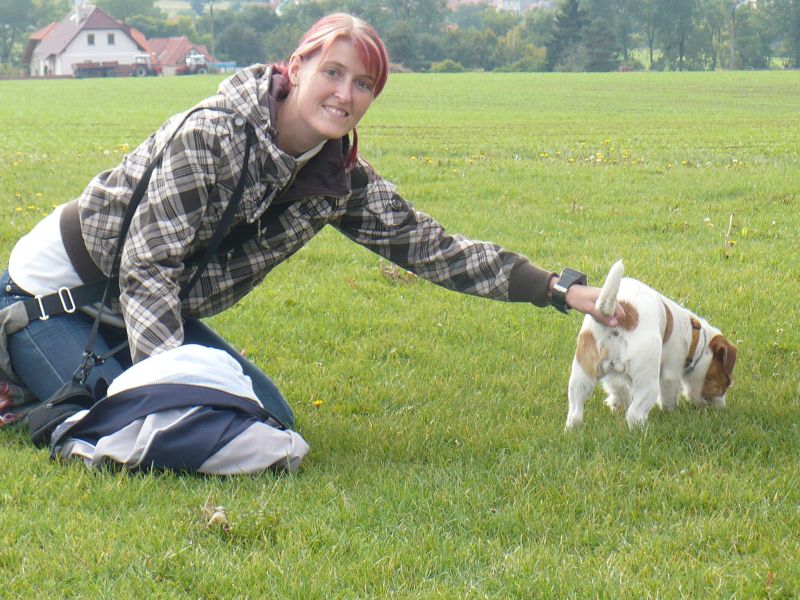The SPES Project is testing technologies that could save lives
The Department of Cybernetics at the Faculty of Electrical Engineering, CTU, is cooperating on a research under the SPES project through the Central Europe Programme. The goal of this program is developing assistive tools that can help disabled people or people with some restrictions in critical situations and in daily life. The tools have to be able to detect falls, localize a person outdoors and indoors, allow unattended communication and call for help or if necessary report a distress call. How exactly does this tool work, illustrates a story of Lenka Ševčíková, a client of protected center ICT, ProDeep o.s.

The Department of Cybernetics, CTU, began with verifying technologies used in medical tools for daily life under the SPES Program. Lenka Ševčíková, a client with a movement disability, was one of the volunteers for pilot projects. She is currently listed in a registry of social care, Distress care, and uses Laipac S-911 designed for localizing people.
She says about her experience with the device testing: "When I was given the Laipac watch, I was not excited at all, at first. I perceived it as a burden and as restriction of my freedom since someone at the control department would always know where I was. Also, I had to think about its charging, so for me it was more like a worry.
At the beginning, when I moved my arm with the watch too quickly, someone from the control center would always call me to ask about what I just did, in order to have a feedback and to know my regime. So when I went for a walk with my dog and I threw him a fetch, the dispatcher called me immediately and said he knew that I was in the forest with my dog and I was throwing him something but he saw it as an alarm and so he just wanted to make sure I was alright that I didn't fall or that somebody didn't attack me. It made me feel nervous and uncomfortable.
Similarly, when I lifted my leg in a wrong way and fell, the dispatcher called to check up on me, asked me if I needed any help or to call an ambulance, if I could walk home on my own etc. Then I realized that the real function of Laipac is to help you not to control you. I feel great support and I feel safe with Laipac, so today I don't do go anywhere without it. My husband and family feel comfortable when I am at home alone since they know that I am always taken care of.
Recently, I walked with my husband in the forest and I told the control center that I am not alone so they don't have to take care of me, but we were attacked by bees and it was terrible. Because I waved my arm a lot, the dispatcher suspected something went wrong and he called a moment after. I told him about the situation and he called an ambulance immediately because we got a lot of bee stings. This way I learned that even though I say nobody has to monitor me, they are always on alert in the control center and it can be a great help.
I can't imagine my life without Laipac now. I am glad that there is always someone watching out for me so I can go by bus or train on my own and I am not so dependent on my family and husband. So, my conclusion is that Laipac actually gives you freedom, not the other way round."
Testing of these tools is conducted in cooperation with a non-profit organization ProDeep o.s. "The main goal of the project is an integration of people with disabilities into normal life so they can stay in their home environment as much as possible, or to increase comfort in their lives. An essential part of the project is connecting technology with communication and technological with social help. Technology on its own does not do much. The tool or service must be accepted by the client. Without feedback from the client and the dispatchers and service providers, without acquiring trust and feeling of freedom, relying on offered help, the tool becomes a burden and as such can be soon put away. The SPES Project has one advantage and that is employing people with disabilities for the dispatchers. services. These people have their own experience not only with their disabilities but with resolving difficult situations.
Their activity is driven by empathy and enthusiasm. They help themselves but the clients actually listen to their 'commands' - such as 'Take your medication'," says the director of the ProDeep o.s. Adéla Kolouchová adds: "Long term cooperation with CTU allows us to help our clients overcome difficulties but also implement new technology in the area of social services. This helps not only the handicapped but also their close ones."
"The cooperation is mutual. Thanks to this Program, CTU can monitor, follow and collect data on the development of the illness of the clients, over period of time, which are relevant and useful data for further research on the illness. Our goal is to develop and test such devices which will allow people live full life with as little complication and restriction as possible," adds Daniel Novak from CTU.
For more information about the project, go to: http://www.spes-project.eu/ and http://www.deep.cz.
The SPES project is implemented through the CENTRAL EUROPE Programme co-financed by the ERDF.
